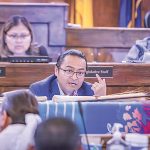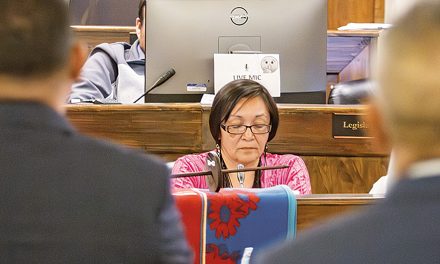
Letters: A letter to home

Hello, my name is Lydell D. Joey and I am from Dilkon, Arizona. I’m an enrolled member of the Navajo Nation and I’m currently incarcerated in an Arizona state prison in Florence, Arizona. I’ve been down for three years and got a couple more left.
I’ve been waiting for letters from family members over the years but it never happened, so I decided to put my info in the Navajo Times and hope I could hear from someone out there on the Navajo Nation.
Here in prison, I ran into some Natives that are half Navajo or from different tribes and teach them the Navajo language.
Here is my address:
Lydell Joey, ADC No. 234229,
Arizona State Prison Complex-Eyman,
Unit-Browning ID 18,
P.O. Box 3400,
Florence, AZ 85132.
In the meantime, I’ll be looking forward to hearing from someone out there.
Lydell Joey
Florence, Ariz.
(Hometown: Dilkon, Ariz.)
EPA needs to follow standards, our water at risk
Last week, I traveled to Albuquerque to attend the Interim Legislative Committee meeting on radioactive and hazardous materials to learn more about what is being done to safeguard our community after the Gold King Mine spill.
It became quite apparent to me that the lasting effects of this spill are not fully understood, and that there is much ongoing study into the impacts of this unfolding environmental disaster.
As we await further action, our community is concerned about the long-term public health and environmental impacts from this spill.
It is critical that we waste no time in continuing to assess the damage of this spill, its impact and how to clean it up.
Water is central to our life in the desert, and its preservation should be a top priority for our elected officials and other decision-makers.
We need to ensure the United States Environmental Protection Agency is following the necessary standards for investigating this spill and moving forward to effectively cleanup the contamination.
The EPA must fully fund the states, communities and tribes for the damage caused by the contaminants from the Gold King Mine spill and the grant application to the EPA should be approved in the full amount.
GloJean Todacheene
Democrat Candidate for State Representative, District 4
Shiprock, N.M.
Nation owes suffering uranium miners
Not a month goes by without the Times or KTNN telling us about the Sih Hasin Fund or the Permanent Trust Fund interest or some other windfall of money coming to Window Rock. Isn’t it time to think about setting some aside to help uranium miners suffering from uranium sickness? Many are in great need, spending what little they receive every month for medical costs.
The nation needs to step up to the plate and help these miners who have sacrificed to feed and clothe their families. Many were never warned of the consequences of uranium exposure by the companies they worked for or by the federal or Navajo Nation governments. Whether they were warned or not, the mines where they worked did not adequately protect them from radiation sickness.
The U.S. government needed uranium for nuclear weapons, and knew of the dangers many years before warning the miners or requiring companies to ventilate the mines properly, provide changing houses and showers, require masks, and other protections.
In 1990, Congress passed the Radiation Exposure Compensation Act to compensate miners for the government’s failure to warn them. But miners say that it is too little, too late. Many miners do not qualify for various reasons, including inadequate medical records and that they worked in the mines after 1970.
The nation needs to include the miners with other elders and veterans as groups with a high priority of need. The nation received royalties and lease payments from uranium mines on Navajo Tribal Trust lands. Doesn’t the nation owe the miners something?
Harris Francis, Window Rock, Arizona
Klara Kelley, Gallup, New Mexico
Personal thanks to those who share vision
My compliments to the City of Gallup and to the business and civic leaders who attended the recent Economic Roundtable for your vision and support for economic development.
With the help of visiting experts, 60 of us gathered on July 12 at the Second Street Conference Center for a day of learning and dialogue on the economic challenges and opportunities of the greater Gallup community.
By all measures, it was a resounding success, as we all got engaged in the detail, learned more about what is happening in the community’s economic development work and brought ideas forward for accelerating our progress.
We all worked to get our heads around the complexities involved in our three primary economic drivers: The Energy Industry; The Tourism Industry; and The Downtown District. These three clusters show up big-time in our research into the areas of our economy that provide the largest share of our revenues, jobs and future competitive advantage. This Economic Roundtable gave us a great opportunity to deep dive into these three economic arenas and to generate ideas and solutions for us to work on.
We all developed a deeper understanding that the complex and challenging task of “economic development” is absolutely foundational to the future well-being of our community. In communities where there is strong commitment and investment in that priority, those communities find a way to grow and thrive. Where there is not such a strong investment, those communities struggle and their prospects fade.
We also learned that “it takes all of us” to truly make it happen. Again the world reveals to us what works: Where there is unified vision and effort, there is progress. Without it, well … there might be some opportunity, there might be some good ideas, and there might be some hard work going on, but real progress is hard — maybe impossible — to come by.
I feel that we as a community took a strong step forward on July 12th, by educating ourselves on the challenges and opportunities, by sharing our questions, our frustrations and our best ideas, and by doing it all in the spirit of “common cause” — with hope for the future.
I think we also got a better feel for the diverse, but coordinated, efforts and contributions already being made by our collaborating economic development partners, and also for what we can all do better and smarter going forward. At the core of this collaboration lies the leadership of the Gallup Executive Directors’ Alliance (GEDA) and its Economic Development Committee — a model that has been recognized statewide as an effective approach to “grasstops” leadership in community development. Founded and led by the Greater Gallup Economic Development Corporation (GGEDC), GEDA includes executive leaders from the City of Gallup, McKinley County, Gallup-McKinley County Chamber of Commerce, Northwest New Mexico Council of Governments, University of New Mexico-Gallup, Rehoboth McKinley Christian Health Care Services, Gallup-McKinley County Schools, and the Gallup Business Improvement District.
The GEDA Economic Development Committee was the team that organized and coordinated the Economic Roundtable on July 12, including the COG, the BID, the Chamber, the City and GGEDC.
Each of these agencies contributed to the planning, to the white papers, and to the staffing support at the Roundtable. The COG coordinated the facilitation process, with its entire professional team on board to serve the participants and capture the dialogue.
Our “outside experts” — all of them known as great “friends of Gallup” — provided wonderful support, bringing up-to-date information, best practices and encouragement to us all. They included Terri Cole, longtime CEO of the Albuquerque Chamber of Commerce; downtown revitalization consultant Elmo Baca, formerly our very own MainStreet & Downtown Development Director; Aimee Barabe, Deputy Secretary of Tourism; Kevin Groenewold, CEO of the New Mexico Cooperatives Association; Mike D’Antonio of the New Mexico Oil & Gas Association; Matthew Jaramillo of PNM Resources; and Jim Glover of The Idea Group of Santa Fe.
Clearly, we had — all in one place — many of the elements needed for our success. Each local economic development partner plays a role — each with a different angle on the challenge, each with a different set of skills and resources, each with a different contribution to the “mosaic” of economic development.
Each business and civic leader plays a role — by driving our economy, engaging the dialogue, forging common efforts and keeping the vision. Our outside consultants play a role — bringing new perspectives, tools and connections that help empower and support all of our work.
The game is afoot, the field is set, the players are assembled. Now is not the time to retreat, but to charge forward. New resources will be needed … not just to keep our economic livelihoods from slipping away, but to invest in new opportunities and initiatives that will build our competitiveness in the global marketplace, uplift the quality of life of our community, retain and expand our local businesses, start new enterprises, attract new industry and employment, and prepare and energize our workforce to move into the jobs we create.
My personal thanks to all who participated in and contributed to this educational/informational event in our community — and especially to those who will continue to share the vision, lock arms and collaborate together in this great work.
Look to the next roundtable workforce development coming soon.
Patty Lundstrom
Executive Director
Greater Gallup Economic Development Corp.
To read the full article, pick up your copy of the Navajo Times at your nearest newsstand Thursday mornings!
Are you a digital subscriber? Read the most recent three weeks of stories by logging in to your online account.







 Highway 264,
Highway 264, I-40, WB @ Winslow
I-40, WB @ Winslow